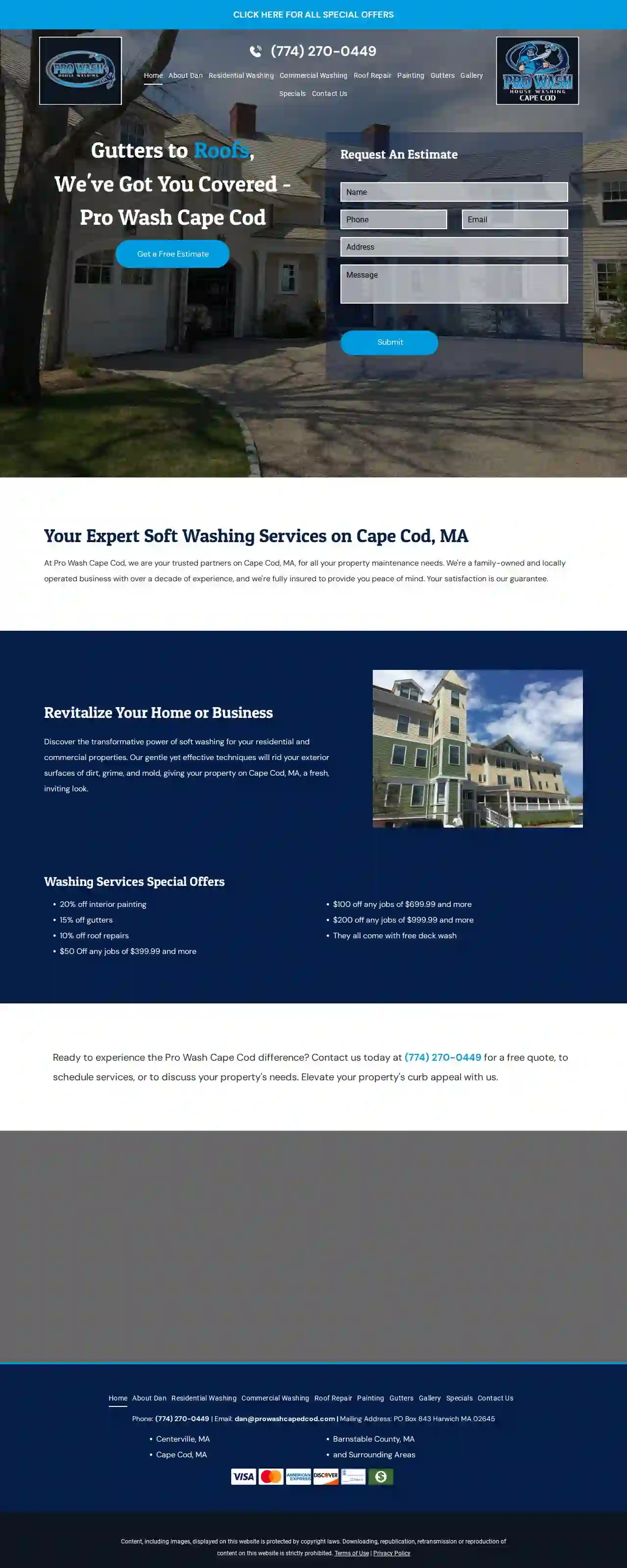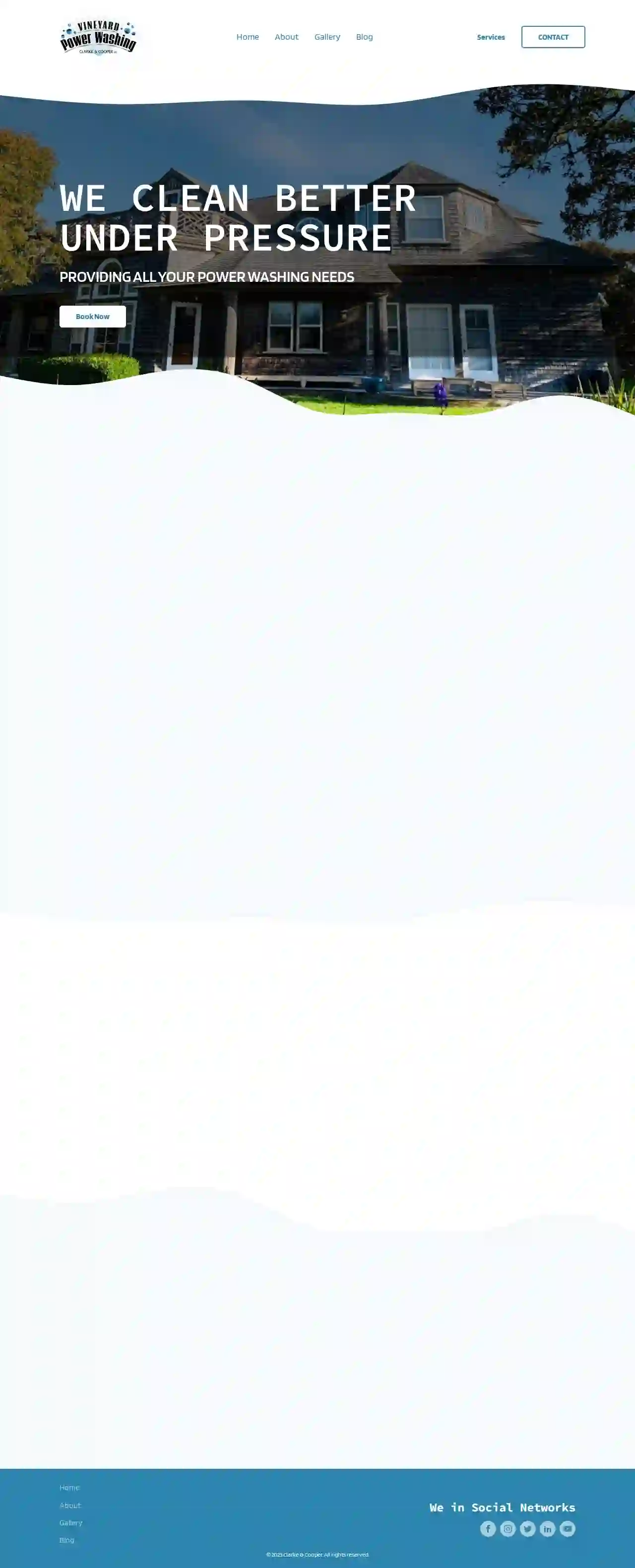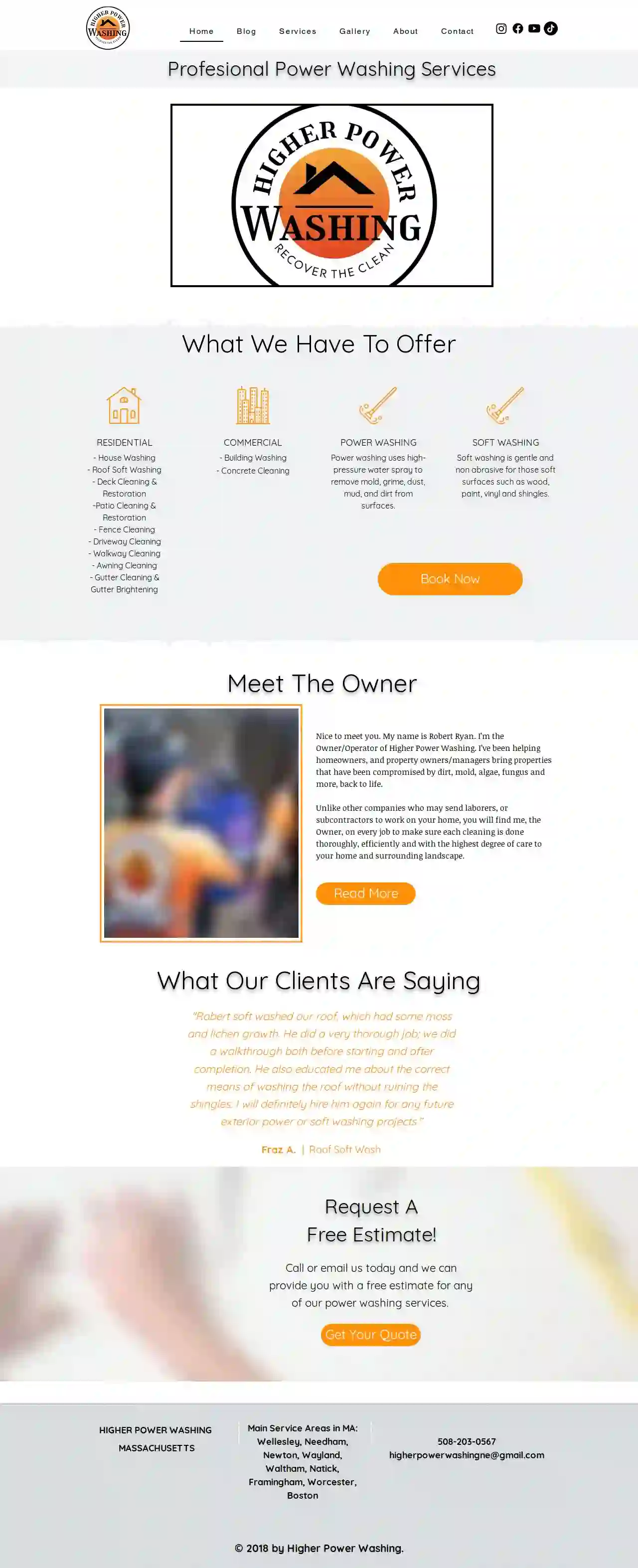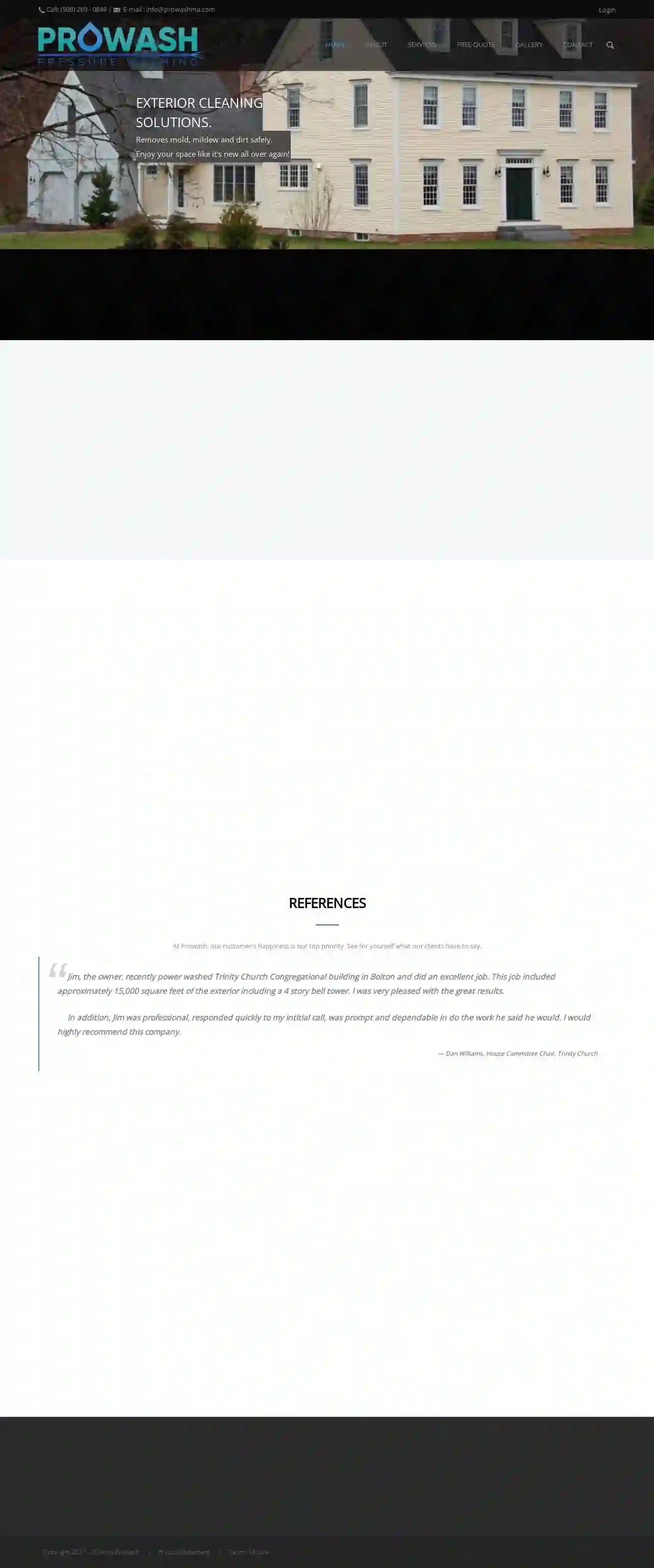Pressure Washing Sherborn
Top Deck and Fence Cleaning in Sherborn
Receive 3 FREE Exterior Cleaning quotes for your project today! Compare profiles, reviews, accreditations, portfolio, etc... and choose the best service.

Benjamin’s Pro Power Washing, LLC
5142 reviewsBoston, USWelcome to Benjamin’s Pro Power Washing, your trusted partner in restoring the beauty and cleanliness of your property. Based out of Methuen, MA, we are dedicated to delivering top-notch, affordable power washing services to both homeowners and businesses. Led by Jake Benjamin, the founder and owner of Benjamin’s Pro Power Washing LLC, we take immense pride in revitalizing properties and exceeding our clients’ expectations. Our Mission: At Benjamin’s Pro Power Washing, our mission is simple yet significant: to enhance the aesthetic appeal and longevity of your property. With every project we aim to create a lasting impression that reflects the true potential of your property.
- Services
- Why Us?
- Our Team
- Gallery
Get Quote
East Coast Power Washing
4.235 reviews58 Tyngsboro Road, Westford, 01886, USEast Coast Power Washing was founded in 2004 by Dave Pessotti, a master power washer with over 10,000 houses/roofs pressure washed over the last 25 years. The company is a sole proprietorship, not a franchise. Shaelagh Teague is the Co-Owner and Operations Manager, with over 30 years of experience working with thousands of customers. The company offers a range of services, including house washing, roof washing, power washing, soft wash, and more. They use bio-degradable eco-friendly soaps and detergents and have a coverage area that includes towns and cities such as Westford, Chelmsford, Lowell, Andover, Concord, and many more.
- Services
- Why Us?
- Our Team
- Testimonials
- Gallery
Get Quote
Exclusive Pressure Washing
523 reviewsPembroke, MA, 9 Parker Rd., 02359, USExclusive Pressure Washing is a professional, licensed, and insured pressure washing business in Pembroke, MA. We provide high-quality cleaning solutions at affordable prices for residential and commercial properties. Our team has received extensive training in all aspects of exterior cleaning and prioritizes the needs of our clients. We offer a variety of pressure washing services, including house washing, roof cleaning, soft washing, driveway washing, sidewalk cleaning, rust removal, gutter brightening, brick & stucco cleaning, pool deck cleaning, fence washing, paver cleaning, mildew & moss removal, and commercial pressure washing. We are dedicated to providing superior customer service and high-quality work. Contact us today to schedule your pressure washing services and get a free estimate!
- Services
- Why Us?
- Accreditations
- Our Team
- Testimonials
- Gallery
Get Quote
Pro Wash Cape Cod
4.56 reviewsPO Box 843, Harwich, 02645, USFor more than a decade, Pro Wash Cape Cod has provided residents and businesses with dependable house washing services. Our company was founded by Dan LaCouture in 2010 following a long 14-year career as a professional hockey player in the NHL, Europe, and Russia. Dan was born on Cape Cod, where he developed a love for hockey. He represented the US in the global arena in the Under-17 and Under-18 World Junior and World Championship Teams. Dan then attended Boston University, and in 1997, at 20 years old, he joined the Edmonton Oilers and started his pro hockey career. Over the next few years, he played for the Pittsburgh Penguins, New York Rangers, Boston Bruins, New Jersey Devils, and Carolina Hurricanes. Outside of the US, he spent a season in Russia playing in the KHL and spent time in Davos and Lugano, Switzerland and Lørenskog, Norway. Whether he's on the ice or house washing your property, Dan has always taken great pride in the work he does. He'll make sure that you're completely satisfied with the results. Call Pro Wash Cape Cod today to get your free estimate. Pro Wash Cape Cod is locally and family owned in Centerville on Cape Cod, and we're proud to be able to support a variety of important charities, events, and organizations. Pro Wash Cape Cod provides house washing services for houses, roofs, fences, decks, patios, and more to residential and commercial areas in Centerville, MA, and the surrounding areas.
- Services
- Why Us?
- Our Team
- Testimonials
- Gallery
Get Quote
Vineyard Power Washing
517 reviewsEdgartown, P.O. Box 1709, 02539, USVineyard Power Washing has been established since 1976. Our team of professionals combine their years of expertise with their diligence and hard work to provide immaculate services to our clients. Vineyard Power Washing specializes in pressure washing of commercial and residential buildings, decks, furniture, patios, fences, roofs, car and boat detailing.
- Services
- Why Us?
- Gallery
Get Quote
Higher Power Washing
4.945 reviewsBoston, USMeet the Owner Nice to meet you. My name is Robert Ryan. I’m the Owner/Operator of Higher Power Washing. I’ve been helping homeowners, and property owners/managers bring properties that have been compromised by dirt, mold, algae, fungus and more, back to life. Unlike other companies who may send laborers, or subcontractors to work on your home, you will find me, the Owner, on every job to make sure each cleaning is done thoroughly, efficiently and with the highest degree of care to your home and surrounding landscape.
- Services
- Why Us?
- Our Team
- Testimonials
- Gallery
Get Quote
All State Mobile Wash
4.942 reviewsHanover, MA, USA, 123 Main St, 02339, USAll State Mobile Wash LLC is a local professional pressure washing and roof cleaning service based in Hanover, MA. They offer a variety of services including house wash, roof cleaning, truck wash, cedar shingle restoration, gutter cleaning, deck cleaning, pool/paver patio, awning cleaning, fence cleaning, and commercial building cleaning. Their priority is customer satisfaction, and they provide residential and commercial work at a reasonable price.
- Services
- Why Us?
- Accreditations
- Our Team
- Testimonials
- Gallery
Get Quote
Even Flow Pressure Washing
553 reviewsBoston, USAt Even Flow Pressure Washing, we understand that protecting the valuable investment you've made in your roof and home is important. Cleaning your roof or the painted surfaces prolongs their life expectancy and is a much less expensive option than having to replace the roof, repaint your house, or replace your siding. Roof washing was invented in 1992 and has been extending the lives of roofs ever since. For a fraction of the cost of a new roof, we can keep your roof looking brand new (without pressure), but more importantly, the integrity of your roof will be extended. We use low pressure washing techniques to remove the black streaks, algae, lichen and moss from your roof, a process that can help your roof last up to 10 years longer. Learn More Safe for Pets & PlantsWe combine a low pressure washing system with biodegradable products that will not hurt your plants or animals. With Even Flow Pressure Washing, dirt and moss don't stand a chance. Learn More Exterior Washing ServiceWhile power washing will remove dirt and grime, it can also permanently damage your siding, screens, gutters, and roofing materials. In the wrong hands, a power washer will leave streaks and do more harm than good.Even Flow Pressure Washing provides a more effective and safer alternative to homeowners in the Worcester/Middlesex area. Learn MoreChoose low-pressure washing from Even Flow Pressure Washing and your house will be the envy of the neighborhood.
- Services
- Why Us?
- Our Team
- Testimonials
- Gallery
Get Quote
Prowash Pressure Washing
52 reviewsBoston, USProwash specializes in residential house washing, offering a variety of wash and clean services at competitive prices to meet all your needs. We have experienced technicians who take their time and pay attention to detail. Our owner is always on site to make sure your service is flawlessly executed. You can expect the best in quality and service from PROWASH. Our service area covers Massachusetts and southern New Hampshire, specializing in Acton, Concord, Sudbury, Westford, Maynard, Marlborough, North Hudson, Shrewsbury, Littleton, Lincoln, Bedford, Groton, Bolton, Lancaster, Chelmsford, Shirley, Clinton, Fitchburg, Leominster and Gardner. Our superior washing process delivers top-notch results for your siding, decks, patios and more. We provide prompt service, free quotes and guaranteed results.
- Services
- Why Us?
- Gallery
Get Quote
Atlantic Power Cleaning
3.73 reviewsP.O. Box 526, Woburn, 01801, USSince 1987, Atlantic Power Cleaning has maintained its leading position in today's industrial pressure washing business by providing customers with prompt, professional service. In addition to our experience, Atlantic uses the latest technology, equipment, and practices to ensure environmental safety every step of the way. We value personal relationships because that's what you appreciate. We are totally responsive and accountable because that's what you require. Serving Boston, MA & Beyond, Based in Woburn, MA, we proudly provide residential and commercial pressure washing services in Boston, Massachusetts and throughout the New England area. Satisfaction Guaranteed – Fully Insured – References Available. Hazmat Certified, OSHA HAZWOPER Certified (includes EPA RCRA and TSCA, DOT and OSHA regulations, Confined Space, Respirator and PPE selection and use, SARA Title 3 Hazard Communication, and Emergency Responder Level 2). All major credit cards accepted.
- Services
- Why Us?
- Accreditations
- Testimonials
- Gallery
Get Quote
Over 60,241+ Cleaning Companies on our platform
Our janitorial pros operate in Sherborn & surrounding areas!
CleaningMatch has curated and vetted Top Janitorial Services in Sherborn. Find a top & trustworthy contractor today.
Frequently Asked Questions About Pressure Washing
- Clear Obstructions: Remove any objects, furniture, or debris from the areas to be pressure washed.
- Close Windows and Doors: Securely close all windows and doors to prevent water or cleaning solutions from entering your home or building.
- Cover Delicate Surfaces: Protect delicate plants, landscaping, or electrical outlets with tarps, plastic sheeting, or painter's tape.
- Inform Your Neighbors: It's a courtesy to inform your neighbors about the scheduled pressure washing, especially if noise or overspray is a concern.
- Communicate Special Instructions: Inform the pressure washing company about any specific areas you want them to focus on or avoid.
- Wood Siding: High-pressure washing can damage wood fibers, leading to splintering or etching. Soft washing is the recommended method for cleaning wood siding.
- Asphalt Shingles: High-pressure water can dislodge granules from asphalt shingles, reducing their lifespan. Soft washing is a gentler alternative for roof cleaning.
- Painted Surfaces: High pressure can strip paint from surfaces. Always test pressure washing on an inconspicuous area before cleaning painted surfaces.
- Windows and Screens: The force of pressure washing can break windows or damage delicate window screens. Traditional cleaning methods are better suited for windows and screens.
- Experience: 'How long have you been in business, and what types of pressure washing projects do you specialize in?'
- Licensing and Insurance: 'Are you licensed, insured, and bonded? Can I see proof of coverage?'
- Equipment and Techniques: 'What type of pressure washer do you use? What cleaning solutions do you use, and are they safe for my surfaces?'
- Safety Precautions: 'What safety precautions do you take during pressure washing?'
- Surface Preparation: 'Will you need to move any furniture or objects before pressure washing?'
- Water Usage: 'Do you use a water reclamation system or other methods to conserve water?'
- Cleanup: 'How do you handle cleanup after pressure washing?'
- Guarantees: 'Do you offer a satisfaction guarantee?'
- References: 'Can you provide references from previous clients?'
- Degreaser: For optimal results, pre-treat the oil stains with a degreaser specifically designed for driveways. Allow the degreaser to sit for the recommended time before pressure washing.
- Hot Water: Using hot water in your pressure washer can be more effective at breaking down oil than cold water.
- Surface Cleaner: Using a surface cleaner attachment for your pressure washer can provide a more even and efficient cleaning result.
How do I prepare my property for pressure washing?
By taking these preparatory steps, you can ensure a safe and efficient pressure washing experience.
Is pressure washing safe for all surfaces?
Always consult with a professional pressure washing company to determine the appropriate cleaning method for your specific surfaces.
What questions should I ask a pressure washing contractor before hiring them?
By asking these questions, you can gather valuable information and choose a pressure washing contractor that meets your requirements.
Can pressure washing remove oil stains from my driveway?
If DIY pressure washing doesn't completely remove the oil stains, consider hiring a professional pressure washing company. They have specialized equipment and experience in dealing with stubborn stains.
How do I prepare my property for pressure washing?
- Clear Obstructions: Remove any objects, furniture, or debris from the areas to be pressure washed.
- Close Windows and Doors: Securely close all windows and doors to prevent water or cleaning solutions from entering your home or building.
- Cover Delicate Surfaces: Protect delicate plants, landscaping, or electrical outlets with tarps, plastic sheeting, or painter's tape.
- Inform Your Neighbors: It's a courtesy to inform your neighbors about the scheduled pressure washing, especially if noise or overspray is a concern.
- Communicate Special Instructions: Inform the pressure washing company about any specific areas you want them to focus on or avoid.
By taking these preparatory steps, you can ensure a safe and efficient pressure washing experience.
Is pressure washing safe for all surfaces?
- Wood Siding: High-pressure washing can damage wood fibers, leading to splintering or etching. Soft washing is the recommended method for cleaning wood siding.
- Asphalt Shingles: High-pressure water can dislodge granules from asphalt shingles, reducing their lifespan. Soft washing is a gentler alternative for roof cleaning.
- Painted Surfaces: High pressure can strip paint from surfaces. Always test pressure washing on an inconspicuous area before cleaning painted surfaces.
- Windows and Screens: The force of pressure washing can break windows or damage delicate window screens. Traditional cleaning methods are better suited for windows and screens.
Always consult with a professional pressure washing company to determine the appropriate cleaning method for your specific surfaces.
What questions should I ask a pressure washing contractor before hiring them?
- Experience: 'How long have you been in business, and what types of pressure washing projects do you specialize in?'
- Licensing and Insurance: 'Are you licensed, insured, and bonded? Can I see proof of coverage?'
- Equipment and Techniques: 'What type of pressure washer do you use? What cleaning solutions do you use, and are they safe for my surfaces?'
- Safety Precautions: 'What safety precautions do you take during pressure washing?'
- Surface Preparation: 'Will you need to move any furniture or objects before pressure washing?'
- Water Usage: 'Do you use a water reclamation system or other methods to conserve water?'
- Cleanup: 'How do you handle cleanup after pressure washing?'
- Guarantees: 'Do you offer a satisfaction guarantee?'
- References: 'Can you provide references from previous clients?'
By asking these questions, you can gather valuable information and choose a pressure washing contractor that meets your requirements.
Can pressure washing remove oil stains from my driveway?
- Degreaser: For optimal results, pre-treat the oil stains with a degreaser specifically designed for driveways. Allow the degreaser to sit for the recommended time before pressure washing.
- Hot Water: Using hot water in your pressure washer can be more effective at breaking down oil than cold water.
- Surface Cleaner: Using a surface cleaner attachment for your pressure washer can provide a more even and efficient cleaning result.
If DIY pressure washing doesn't completely remove the oil stains, consider hiring a professional pressure washing company. They have specialized equipment and experience in dealing with stubborn stains.